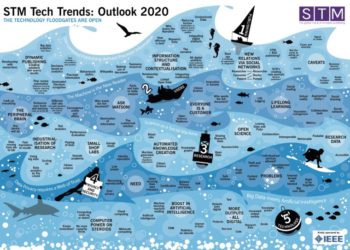As television host Jimmy Kimmel notes in the video below, climate change is not a political issue, it’s a scientific one, and it’s one upon which there is scientific consensus. Despite this, there remains a significant portion of the population that somehow thinks that the scientific community is playing some sort of twisted prank, and lying about their results for unknown reasons. As Kimmel notes, we believe scientists when it comes to molecules, the speed of light and Cialis, why not climate change? This speaks to the continued undermining of credibility that the scientific community faces, and why better public outreach is so vital.
At the end of the video below, a public service announcement from actual scientists hoping to make it clear: we’re not f*&%ing with you.
Discussion
12 Thoughts on "Science Credibility: A Public Service Announcement"
Familiarity breeds contempt, and everyone is familiar with inaccurate weather forecasts. People look at a science that often can’t predict what will happen on Thursday, and ask why they should believe it knows what will happen in twenty years – let alone why it happened and what will stop it.
I realize that climate scientists don’t view themselves as in the same box as meteorologists. But non-scientists do; and one way to strengthen respect for climate science might be to point out the measurable improvements in meteorology, and remind people how invaluable it has been in predicting recent disasters.
As a scientist, I find the climate debaters’ repeated suggestion that the public should just believe anything the scientific community agrees upon disturbing. It is inconsistent with the conceptual basis of science, which is against accepting authorities as the arbiters of truth; and the scientific consensus has made some terrific bloopers in the past. At one time it promoted eugenics. At another time, it prescribed thalidomide. Let’s not play the authority game; let’s earn people’s trust with accurate predictions.
Much of the population does not know the difference between a scientific theory and thinking. In short, scientists have failed to explain what they do, how they do it and the role theory plays in the process.
The short answer to the question “why not climate change?” is social media. The public policy aspects of this issue (which I have tracked since 1992) have attracted a great deal of public interest to the scientific issues.
The longer answer is that the question is badly defined. For while the majority of scientists, perhaps 80%, believe that humans are causing dangerous global warming, there is in fact no consensus. Rather there is a sizable vocal minority of scientists and they are being heard.
The result is a great scientific debate, with these three general schools of thought (individuals vary greatly within each school):
1. Warmers believe in dangerous human caused warming.
2. Lukewarmers accept human causation but think the warming benign, or even beneficial.
3. Skeptics (called deniers by the warmers) question the dominant role of humans, versus natural variability such as emerging from the Little Ice Age.
The great scientific debate can best be seen here: https://judithcurry.com/. An amazing blog run by a prominent climate (lukewarmer) scientist, with all sides present and over 780,000 comments to date. Of course these comments also range over the extensive energy, policy and political issues. They even debate about the debate, as it were.
The climate change debate is historic and social media have a lot to do with that.
I should add that this question is itself an active scientific research topic. A Google Scholar search on “climate change” plus “risk perception” since 2012 gives about 8,700 hits. Unfortunately the issue is so politicized that the results are highly dependent on the school of thought of the researcher.
I don’t know if I am a scientist. I don’t have 15 hundred bucks to pay for an article. Maybe I am not. But I also find “scientific consensus” disturbing.
There is a lot of propaganda but of low quality. It hurts the cause.
Simply wonderful. I wish Kimmel (whose show I do not watch) were the head of communications for AAAS.
Jimmy Kimmel’s comments, in my opinion, were more convincing than the video. Why was it necessary to resort to wink-wink profanity to make the point? Doing so degrades the seriousness of the topic. There was a time when swearing was considered indicative of the speaker’s inability to use the marvelous English language skillfully. And having a child spew the f-word is not cute, it is just sad.
Interesting criticism of the Kimmel video, from warmer Randy Olson, that it actually helped the skeptics by promoting their new “Climate Hustle” movie — http://www.scienceneedsstory.com/2016/05/05/38-jimmy-kimmel-helps-climate-hustle/. Apparently Olson prefers the “ignore them” strategy to the “criticize them” strategy. The warmer community is divided on this.
Curry has posted a link to the Olson blog (along with a bunch of other science related links) but so far no comments thereto. See https://judithcurry.com/2016/05/07/week-in-review-science-edition-40/#more-21507.
While I think outreach is very important, I tend to disagree with promoting an approach of “trust the scientists because they’re smarter”. If everyone took this approach no Ph.D. thesis would ever be written. It is a core principle of science that people ask questions, so why are we telling them that asking questions is dumb? What I think scientists should do is explain how they arrive at their conclusion, preferably without condescending (“we have Ph.D.s”? Really?) and in laymen terms, and welcome questions, even from people who disagree with us. Even if they sound like Sarah Palin.
I would not call this outreach. If you want to reach people making fun of them is probably a bad plan. In particular, while most warmers are Democrats (as are most scientists), most non-warmers are Republicans (as are most engineers) and Palin is a hero to many of them. This piece is written by warmers for warmers, just as Hustle is written by skeptics for skeptics. There is a lot of this on all sides. We might call it in-reach.



